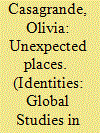| Srl | Item |
| 1 |
ID:
158900


|
|
|
|
|
| Summary/Abstract |
There is no convincing evidence to prove that China's Lewis turning point (LTP) arrived in 2004–2005, as suggested in some of the existing literature. Employing data from the National Bureau of Statistics of China for 70,000 rural households and following the method proposed by Minami (1968) to identify the Lewis turning point in Japan, the present study reassessed the reaching of the LTP in China and found that China's economy reached the LTP around 2010. From a regional perspective, China's eastern region reached the LTP in 2010 and its central and western regions are now approaching the turning point. After arriving at the LTP, China's rural economy will face three key tasks: safeguarding grain security, promoting economic restructuring and realizing agricultural modernization. To cope with the shortage of human capital in agriculture production and the challenge of the tight balance between grain supply and demand, the Chinese Government should improve the human capital training system, accelerate agricultural modernization and guarantee national grain security.
|
|
|
|
|
|
|
|
|
|
|
|
|
|
|
|
| 2 |
ID:
184073


|
|
|
|
|
| Summary/Abstract |
This article explores the relationship between land, words and silence, and the ways they are articulated in biographical trajectories. In the context of displacement and successive home-making, it follows the spatial and temporal trajectories of a Mapuche family, their non-linear routes through the experience of exile, and the process of dwelling in the elsewhere. Exile is addressed here as a condition of being, a tension between presence and absence that involves loss, and that is negotiated through the interplay between words and silence, leading to the meaningful emergence of what I call ‘unexpected places’. At the core of this argument is a recognition of the intersubjective and hermeneutic borders that exist between persons in relation to speech and silence, in this case my partial understanding of the word ‘land’ (mapu), which disclosed the limits of language and the specificity of one’s lifeworld, and thus the boundaries of anthropological knowledge.
|
|
|
|
|
|
|
|
|
|
|
|
|
|
|
|